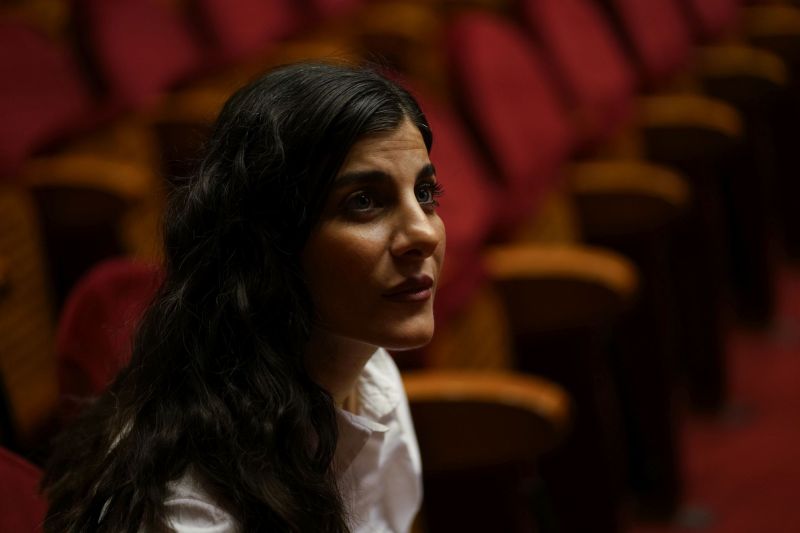63rd THESSALONIKI INTERNATIONAL FILM FESTIVAL //
3-13/11/2022
Screening of the film No Bears by Jafar Panahi
Q&A with Mina Kavani
The screening of the film No Bears by Jafar Pahani, the Iranian director, imprisoned by the Iranian regime, was held on Friday, November 4th, at the packed Olympion theatre. Actress Mina Kavani, self-exiled in Paris, honoured the screening of the film. Elise Jalladeau, the General Director of the Thessaloniki International Film Festival, took the floor and expressed her regret that Jafar Panahi, the film director, would not be able to watch the screening in Thessaloniki: "Jafar Panahi, an old friend of the Festival, unfortunately cannot be here with us. But we are honoured to welcome Mina Kavani, the protagonist, who does not have the opportunity to go back to Iran because she lives in exile in Paris."
Elise Jalladeau welcomed Mina Kavani, who was warmly applauded, and noted that, despite her young age the actress has already had a remarkable career in cinema as well as in theatre. She also mentioned that Mina Kavani's debut, the film Red Rose, was filmed in Athens. "We welcome Mina somewhere between an Abu Dhabi flight, where she is filming a TV series, and a flight to Nantes, my hometown," concluded the festival's General Director.
Mina Kavani took the flour by expressing her enthusiasm for being in Greece, "the country of her heart". "In Athens I feel at home. Besides, I once lived in Exarchia for three months. I am though also in love with your own city” she noted. “I am sorry that Jafar Panahi is not here with us, but his film travels to festivals everywhere and that makes me happy. I am proud of the result and the film we are about to see. I hope the atmosphere in this room reaches him as well." There was a short intervention by three women, activists, who raised a banner with the message "Woman-Life-Freedom", written in both English and Arabic, as a solidarity message for Iranian women fighting for freedom and respect for their rights.
After the film screening, a Q&A with Mina Kavani followed. Asked on how they managed to work with the director remotely, Mina Kavani replied: "Jafar followed us everywhere via Zoom and WhatsApp. Although he was physically absent, he was always present. As an actor, I believe that the way a director sees the actor is so important. That was the reason why it was initially so hard for me to do distance shootings. I often wondered about the situation we were experiencing, as I cannot go back to Iran, while Jafar is not permitted to leave the country. Jafar taught me something important: always search for different ways to be there, to be present."
Asked about the education system in Iran and how it maintains prejudices, Mina Kavani replied: "I feel that the film has no intention on commenting on the education system, or on presenting an aspect of local society. I believe the film wishes to focus on how a border can define your life, your beliefs and your identity. Even if you cross this border, you have to carry your identity with you." Finally, when asked how she felt watching the film, while she cannot go back to Iran, Mina Kavani said: "It was touching not only to watch it, but also to play in this film. My heroine has been trying for ten whole years to return to her country. The monologue scene, where I look at the camera, strongly reminds me of the Edvard Munch painting “The Scream”, for it exudes a tinge of rage. I had a lot of conflicting feelings participating in this film and seeing it in the theatres: a lot of pain, but also a lot of joy. It is a great opportunity to be able to shout out loud what the word refugee means, as well as what suffering can a dictatorship cause to people”.
One of Iranian cinema’s most fervent voices of resistance, multi-awarded director Jafar Panaji stands up to censorship and repression, armed with his films, attaching to cinema a dimension that goes way beyond the sphere of art. Found guilty in 2010 after been accused for “propaganda against the Iranian government”, Panahi was sentenced to a 6-year imprisonment (the ruling is yet to be finalized, following his appeal), and a 20-year prohibition from directing films, writing scripts and giving interviews to local or international media. Moreover, he is not allowed to leave the country, except for cases of medical reasons. Last July, Jafar Panahi was arrested by the authorities and has been in custody ever since, along with directors Mohammad Rasulov and Mostafa Alehmad. The three Iranian filmmakers had protested against the incarceration of women documentary filmmakers, Firouzeh Khosrovani, Mina Keshavarz, Shilan Saadi and Parisa Anvari, as well as of the photojournalist, Reyhaneh Taravati.















